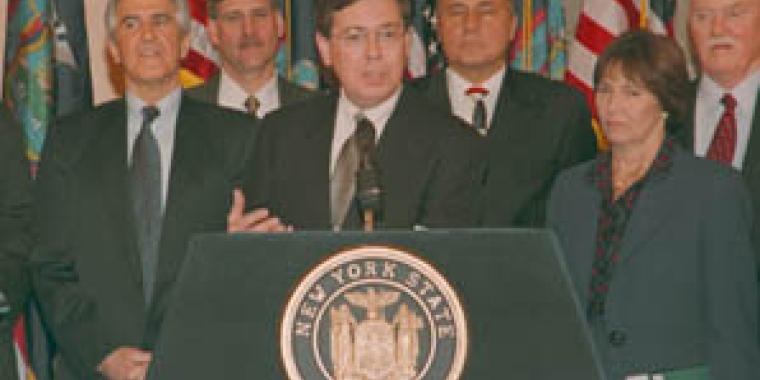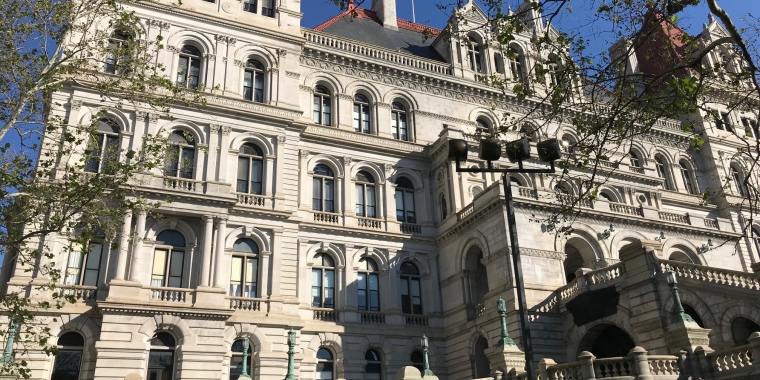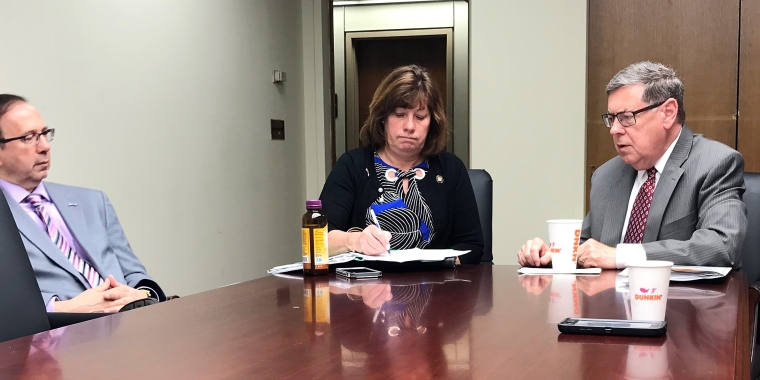
Senate Targets Methamphetamine Labs

The New York State Senate will act today on a package of legislation that would crack down on the production of dangerously addictive methampetamines by establishing tough criminal penalties for possessing the materials used to make "meth" and operating the laboratories used to manufacture the drug.
"Rural areas get targeted for the production of meth, for various reasons," Senator Seward said. "It's time we give the police and prosecutors more tools in their arsenals to shut these 'labs' down."
"New York law currently hangs out a welcome sign to meth manufacturers, when what we need are laws to put meth manufacturers out of business in this state. If we don’t enact these tough new laws this year, we risk a rapid increase in addiction, violence and tragedy that are the byproducts of rampant methamphetamine production and use," said Senator George H. Winner, Jr. (R-C, Elmira), whose legislative district in the Southern Tier-Finger Lakes region has been identified as a hotbed of criminal meth activity in New York and who sponsors several anti-meth measures in the Senate that have bipartisan Assembly support.
"The Senate's action on these bills is the beginning of what I hope will be a comprehensive, bipartisan effort this session to address escalating methamphetamine use and manufacture in New York," Senate Majority Leader Joseph L. Bruno said. "We need to do everything we can to encourage the enactment of tough new meth laws this session and put an end to this crisis that is poisoning our children and our communities."
One bill (S.1844), sponsored by Senator Winner, would make it easier to prosecute manufacturers of the illegal drug, commonly known as "meth," and would create a new class of felony crime for operating a meth drug lab in a residential neighborhood.
Federal law imposes tough criminal penalties on people who, with the intent to manufacture meth, possess just one of a number of listed ingredients. New York's current controlled substances "precursor law" punishes only those who possess a combination of chemicals with the intent to illegally manufacture a drug. This bill would adopt the federal standard that only one of a designated list of ingredients must be found in the possession of a person, who a jury concludes intends to manufacture meth, in order to support a felony conviction of criminal possession of precursors of controlled substances.
The bill would also create a new felony crime for the criminal manufacture of methamphetamine in or near a residence. Strict penalties would be imposed for setting up or operating illegal meth labs within 500 feet of a dwelling. Since meth manufacturing includes the use of highly explosive, flammable and toxic chemicals, meth labs pose a significant public health and safety threat if located in residential neighborhoods.
Earlier this year, the Senate passed a bill (S.1712 that would would create a new felony crime for "operating a controlled substance establishment." Property owners would be held criminally responsible for "knowingly and intentionally" allowing people to manufacturer meth, or any other illegal drug, sellers to operate on the premises they own.
Meth-related action in the Senate continues to gain ground following a state report earlier this year warning that methamphetamine will become an increasingly dire public health and safety threat unless New York adopts new and tougher laws to combat the drug’s proliferation. The report by the State Commission of Investigation (SIC), "Methampehtamine Use & Manufacture," warned that the drug’s rapidly growing use and manufacture "poses an urgent threat to public health and safety and without new and tougher laws to combat the threat, New York could become a haven for methamphetamine users and manufacturers."
"I don’t like it when New York is singled out as an attractive destination for meth manufacturers and dealers. We can’t sit back and allow our region to provide a harbor for these illegal operations," said Senator Seward.
Legislation (S.3511), sponsored by Senator Michael F. Nozzolio (R-C, Fayette), would impose significant criminal penalties upon persons who operate or assist in the operation of clandestine methamphetamine laboratories and would increase penalties for the theft of, or possession of, stolen anhydrous ammonia, which is used to manufacture meth.
Anhydrous ammonia is most commonly used as an agricultural fertilizer and industrial refrigerant generally stored and used at agricultural retailers and facilities. Thieves profit from the ammonia when they steal it from farmers and sell to illegal drug makers.
In addition to its use in the production of illegal drugs, the United States Federal Bureau of Investigation (FBI) is concerned with anhydrous ammonia’s potential use as a chemical weapon. The substance is stored as liquid under pressure and becomes a toxic gas when released into the environment. The toxic cloud of gas can travel along the ground before dispersing into the air where it can have deadly effects.
The Senate will also act today on a bill (S.484), sponsored by Senator Dean Skelos (R-C, Rockville Centre), that would make it unlawful to sell more than three containers of certain medications containing ephedrine or pseudoephedrine.
Pseudoephedrine and ephedrine, used properly, are decongestants which relieve nasal discomfort caused by colds, allergies and hay fever. They relieve stuffy nose, open nasal airways, and drain sinuses. Some brand names of pseudoephedrine include Afrin, Pediacare, Sinutab, and Sudafed. However, pseudoephedrine or ephedrine are one of the main ingredients or precursor substances used to make the illegal substance known as crystal methamphetamine (crystal meth).
Criminals who operate meth labs have easy access to the precursor substances used to manufacture this illegal substance, making it necessary to restrict the sale of large quantities of pseudoephedrine and ephedrine.
The states of Arizona, Arkansas, California, Georgia, Missouri, North Dakota, Oklahoma and Washington all have some form of restricted purchasing access of products containing pseudoephedrine and/or ephedrine on their books.
Pediatric products labeled as such by federal regulation are exempt due to the fact that they are formulated specifically for use by those under 12 years of age. Therefore, they contain much less pseudoephedrine than an adult-strength product. In addition, these products are typically in a dosage form that makes it very difficult to illicitly extract the pseudoephedrine - liquids and chewable tablets for easy dosing to children.
###



